The 2017-18 National Hockey League Trade Deadline is six weeks away, and speculation is rampant the Toronto Maple Leafs will be in on the action.
With some holes on defense, a number of significant contributors entering free agency and the looming specter of the Mitch Marner, Auston Matthews and William Nylander contracts, the Leafs have some tough decisions ahead.
Do they add at the deadline and load up for a run at the Stanley Cup? Do they make a pre-emptive strike and trade one or more pending free agents to ensure some sort of return? Do they get real crazy and trade one of their young studs?
The best course of action, barring a serious injury and or other unforeseen circumstances, might just be to do nothing. Absolutely nothing.
Leafs’ Pending Unrestricted Free Agents
According to CapFriendly, there are eight Leafs in need of new contracts for next season, and a number of others elsewhere in the organisation. Obviously, given the brainpower at the organisation’s disposal, I’m sure the team has a plan for each and every one of them.
For the purposes of the trade deadline, it will be most interesting to see what the Leafs do with their pending unrestricted free agents; the players the organisation has no control over come the summer and, thus, risks losing for nothing.
The team’s three biggest pending UFAs are Tyler Bozak (currently making $4.2 million per season), Leo Komarov ($2.95 million) and James van Riemsdyk ($4.25 million).
Tyler Bozak
Bozak is a versatile centre with experience playing up and down the lineup and in all situations. There are concerns about certain parts of his game, but he has provided consistent production throughout his time in Toronto (much of it spent on horrendous teams).
Naturally then, Bozak would be an ideal depth centre on a contending team. Like the Leafs, for instance.
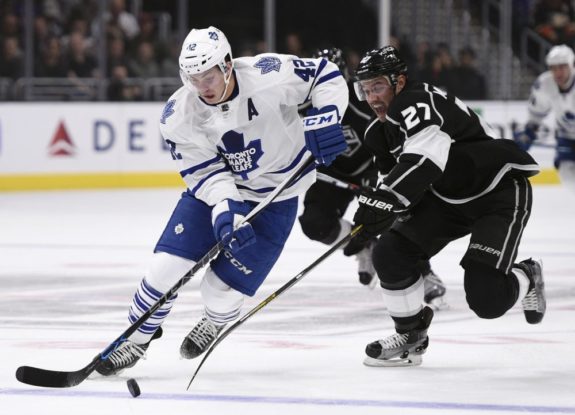
Yes, Toronto might be able to use Bozak to squeeze some relatively high draft picks out of desperate teams, especially considering players like William Nylander and Patrick Marleau have experience playing centre. However, I think the Leafs would do well to keep Bozak, as the versatility he provides outweighs what they can realistically expect to get in return.
Plus, though the Leafs do have a couple promising players in development at the centre ice position, it’s by far their weakest prospect pool. I consider Bozak to be the Leafs UFA most likely to be retained at the trade deadline, as well as come the offseason.
Leo Komarov
Uncle Leo is a fan-favourite in Toronto, but his production, never spectacular, has slipped dramatically this season, despite heavy usage.
Nevertheless, his versatility, ability to kill penalties (and play the power play, for some reason), and abrasive, annoying style of play would make him an ideal pesky forward on a contending team. Like the Leafs, for instance.
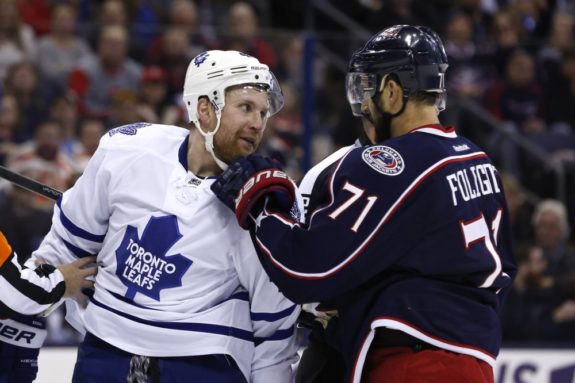
It’s also worth noting that Komarov’s lack of production might have decreased his trade value to the point where it’s more practical to retain him rather than take a chance on a low-end draft pick or prospect.
Even though I consider Komarov the Leafs UFA most likely to be moved at the trade deadline, I still expect to see him on the team come the spring. And even though I feel he is not likely to be re-signed next season, Leafs fans would welcome him back in a second (albeit at a monetary haircut).
James van Riemsdyk
Perhaps the most interesting case of the three is that of van Riemsdyk. The mammoth forward is unmatched on the Leafs for what he brings in terms of size and skill in tight. On pace to exceed his career-high in goals, not to mention good health through four of the last five seasons (unusual, given the style he plays and the punishment he takes), van Riemsdyk’s value has never been higher.
His ideal combination of size and skill would make him an ideal power forward on a contending team. Like the Leafs, for instance.
The Leafs aren’t exactly known for their size. They don’t necessarily get pushed around, but considering you basically have to murder a guy to get any sort of penalty in the playoffs, some extra size-induced offense certainly can’t hurt.
Replacements Available for Pending Free Agents
Since defensemen seem to be the Leafs’ biggest issue at the moment, it makes sense to suggest they’d want one or more blue-liners coming back in any trade they make. However, should their current lineup be optimised, their back end really doesn’t look all that bad. Let’s also not forget the Leafs have pieces like Andrew Nielsen and Timothy Liljegren in the pipeline that have the chance to join the big club in the very near future.
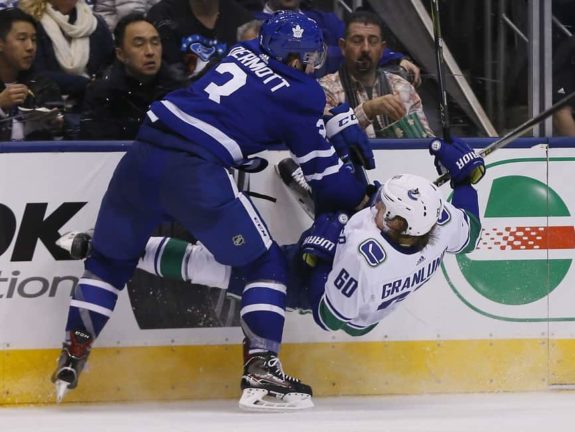
Plus, if you’ve watched the Pittsburgh Penguins’ championship runs the past two years (particularly last season, when the Pens didn’t even have stalwart Kris Letang), you’ll note that a cohesive defense corps playing a simple, straightforward game can be just as effective as a star-studded blue line.
As for forwards, there is a bevy of NHL-ready (or almost-ready) talent just waiting for the call, particularly on the wings (with Kasperi Kapanen at the head of the pack). Heck, Josh Leivo’s already been up with the big team for what seems like forever; maybe he can finally get in a game or two!
Simply put, even if the Leafs lose their pending UFAs for nothing, it’s not as though the team will be unable to plug those holes from within.
Idealism Versus Realism for the Leafs
Leafs Trade Speculation Overly Optimistic
It’s not hard to see the rationale for the Leafs trading one or more of these players. A big buzzword (buzzterm?) lately has been “asset management.” That is, it’s preferable to get something for an expiring asset, rather than risk losing it for nothing in free agency.
Plus, the trio of players mentioned are some of the longest-tenured Leafs (with Bozak having been with the organisation longer than anyone), and allowing the younger crop of Leafs to assume the leadership roles has to happen sometime, right?
However, trading away one or more of these three useful, experienced forwards may handicap the Leafs down the stretch and into the postseason. Not only do players have to adjust to new linemates on the fly, the Leafs will surely have a better chance to contend with the unique skills (and depth) each member of this trio provides.
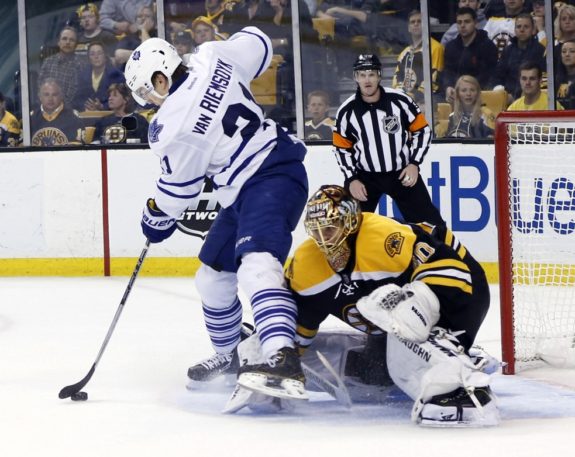
But perhaps my biggest problem with the speculation surrounding the Leafs and the trade deadline is the assumption there are willing trade partners out there for pieces like Bozak, Komarov and van Riemsdyk. Certainly, all three would make very effective additions for another team’s Cup run. But the expectation is that the Leafs would receive a key piece in return, most likely a defenseman.
I just can’t see a team that thinks enough of their championship chances to trade for one of these big names being willing to give up a top-four defenseman (that is preferably right-handed).
Which leaves draft picks as the probable return, meaning the Leafs would be actively sabotaging their chances this season, instead gambling on getting someone better a few years down the road. Such a pre-emptive strike would indeed yield assets, but that also assumes the team will capitalise on said assets. Draft picks are always a gamble and their acquisition might make the team worse in the short term.
It just doesn’t make sense.
Leafs’ Worst-Case Scenario
Naturally, the worst-case scenario appears be the Leafs losing all three of these pending UFAs and getting nothing in return.
Well, “nothing” might be an overstatement; cap space and roster spots are not insignificant assets.
But still, it’s not a good look, especially in the case of Bozak, who plays centre, a position the Leafs organisation is not the deepest in.
Leafs’ Best-Case Scenario
The absolute best-case scenario would be a sign-and-trade of one or more of these three UFAs. Given that Marner and Matthews have one year remaining on their entry-level deals, the Leafs have a year to play with before their cap situation gets overly tight. In that case, why not try and re-sign one or more of Bozak, Komarov and van Riemsdyk to multi-year deals at reasonable salaries? That way, the team can still go for it next season, and simply make some trades in the offseason, à la the Chicago Blackhawks of recent memory.
Of course, that’s assuming these players agree to re-sign in Toronto; any good agent, if not the players themselves, should see the writing on the wall. I can’t see any of the trio, with this likely being their last shots at long-term, highly salaried UFA contracts, giving the Leafs any sort of deal in this regard, particularly if they know they’ll likely be somewhere else in a year’s time.
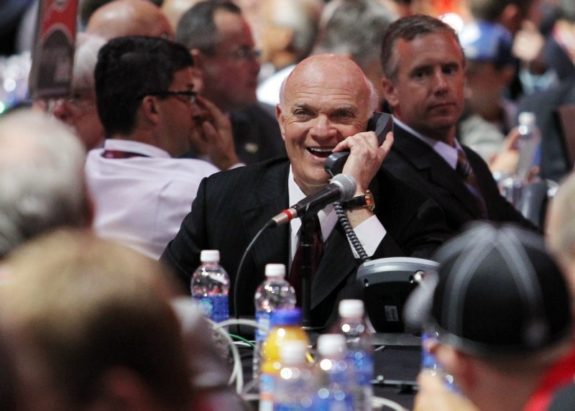
Next, the Leafs would have to find trade partners willing to take on the dollars and term of such deals. While I can’t see many teams lining up to help Toronto (unless Lou Lamoriello and Co. have some Stan Bowman-level dirt on the rest of the league), surely they’d be able to get something in return. Even if it’s cents on the dollar, it’s a fair argument that getting something is better than getting nothing.
That said, I’m not sure it’s worth the risk there will be no takers that would allow the Leafs to leave no strings attached (no retained salary and the like). Such uncertainty is a very real possibly if the members of the trio the Leafs re-sign demand excessive term and monies, which is very likely given the stage of their careers, the Leafs’ plan for them, and the fact that, to fulfill said plan, said contracts would likely have to be free of movement-related clauses.
So maybe doing nothing and risking losing their UFAs wouldn’t be so bad after all.
Leafs’ Rebuild Needs Balance
The whole idea of the Leafs’ rebuild – any rebuild, for that matter – is to build a team that contends for a long time, ideally winning the Stanley Cup at least once.
A number of things have to go right for this to happen: you have to have the horses to compete, a workable system of play, good health under deplorable conditions and a healthy dose of blind luck.
But perhaps the most important characteristic any contending team can have is the ability to be honest with itself. Good teams make tough choices. Good teams are able to balance a single year’s Cup run with being competitive long-term. Targeting one particular season and going all-in is not the brightest idea, but neither is constantly trading away useful players for futures, in hopes of indefinitely contending.
Toronto is going to be competitive for a long, long time. There’s simply no need for them to give up futures to load up for this season. There’s also no need for them to shoot themselves in the foot for this season by trading away useful players.
And that’s why the right balance for the Leafs is doing absolutely nothing. Sometimes, it’s the hardest thing to do.
But it’s often the best thing, too.